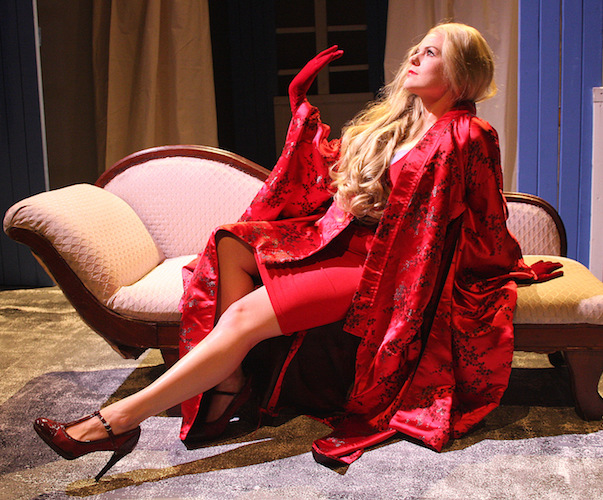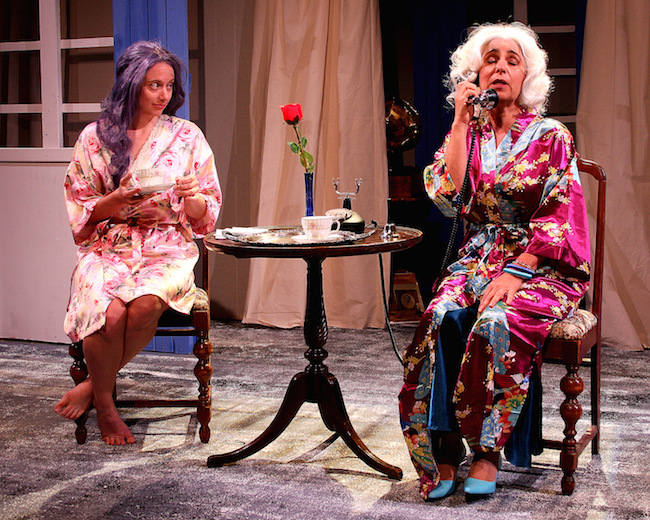Fuse Theater Review: “Eight by Tenn” — Tennessee Williams’ Miraculous Miniatures
Eight by Tenn offers eight stories whose psychological depths and linguistic riches rival those of most full-length plays.
Eight by Tenn: Short Plays by Tennessee Williams by Tennessee Williams. Directed by David J. Miller. Presented by Zeitgeist Stage Company at the Boston Center for the Arts, Boston, MA, through October 8.

Alexandra Smith in “The Lady of Larkspur Lotion” in Zeitgeist Stage Company’s “Eight by Tenn.” (Photo: Richard Hall/Silverline Images.)
By Ian Thal
There has been a recent surge of interest in Tennessee Williams vast, lesser known canon of short, one-act plays. Just a few months ago Beau Jest Moving Theatre presented Wild Williams, an evening which brought together three of his weirder, more absurdist works. That bill was well suited to that troupe’s physical aesthetic, which is rooted in playful visuals. For those looking for expert doses of Williams’ poetic realism, Zeitgeist Stage’s Eight by Tenn is as fine an introduction to Williams’ shorter works as one can hope for.
Williams is one of American theater’s greatest wordsmiths, drawing on language to explore how we construct our sense of self. In his works, characters use words to construct elaborate delusions. These vulnerable figures either succumb to logorrhea once their illusions (inevitably) run up against harsh reality or use language to defend themselves against oppressors (whether real or perceived) who confront them with questions, sarcasm, and blunt declarations. It’s little wonder that Williams was so often attracted to the trials and tribulations of the abused — those strong-armed by society, economic conditions, misogyny, physical threats, and mental illness. These are people whose only power is linguistic: they use language to protect what little they have. Or, in the case of the cruel, they use it thuggishly.
The evening opens with This Property is Condemned (1946) best known for the 1966 film adaptation directed by Sydney Pollack. It opens innocently enough, with Tom (Jake Orozco-Herman) a boy playing hooky encountering a flamboyantly dressed girl, Willie (Rae Bell) using a train track rail as a balance beam. Tom isn’t fully capable of understanding, let alone empathizing, with the story that Willie tells him of parental neglect and abandonment, of a romantic admiration for a glamorous older sister who was “the main attraction” for the railroad workers who stayed at the family’s boarding house before she died, leaving the younger sister her clothes, jewelry, and suitors. Willie romanticizes a confused existence of childhood games, youthful pluck, and precocious sexuality, though she seems resigned to the idea that she might die alone and soon.
The Lady of Larkspur Lotion and Portrait of a Madonna (both written in 1941, the latter revised in 1944) feature protagonists, Mrs. Hardwicke-Moore and Lucretia Collins (each played by Alexandra Smith), who can be seen as prototypes for Blanche DuBois in 1947’s A Streetcar Named Desire (Miller, who doubles as the scenic designer, tellingly puts the the same chaise lounge center stage in both plays). These are a pair of fragile southern belles who in hard times (both economic and post-tramatic) have retreated into the world of delusion and “kindness of strangers.” Hardwicke-Moore poses as an heir to nobility with a rubber plantation in Brazil. In reality, she has trouble paying the rent to the landlady, Mrs. Wire (an acerbically funny Karin Trachtenberg). There’s a suggestion that what money comes in is the result of prostitution. An equally delusional neighbor, an inebriated writer played with aplomb by Zach Winston, becomes involved, not just to defend the lady, but to assert the notion that delusion is our last defense in a cruel world. Portrait features Lucretia Collins, an elderly woman who is unaware she is about to be taken to be institutionalized. The building’s porter (Winston) and manager, Mr. Abrams (Damon Singletary), had attempted to keep the mad Madonna safe and comfortable, protected from the crass world, but it is becoming harder and harder. Whether because of dementia or a nervous breakdown, she has begun to act out on her delusions, perhaps revealing the trauma that caused a proper Episcopal Sunday school teacher from Mississippi to move to the Big Apple thirty years prior.
In Auto da Fe, Singletary steps into the spotlight as the paranoid asthmatic postal worker Eloi who, after coming upon a lewd photograph while performing his official duties, becomes convinced that the world’s corruption can only be redeemed by fire. The performance is gripping and intense, played out in the course of a front porch conversation with his similarly moralistic, though more pragmatic, mother (Michelle Dowd). The piece is chillingly current in our age of viral terrorism.

(L to R): Kelley Estes and Karin Trachtenberg in “Something Unspoken” in Zeitgeist Stage Company’s “Eight by Tenn.” (Photo: Richard Hall/Silverline Images.)
Director David J. Miller expresses a deep affection for Williams in this production. He draws on the ample talents of his excellent cast members and discovers revelatory nuances that are only faintly suggested by the texts. This is aptly demonstrated in Something Unspoken (1958). What is spoken is an outward conflict: aristocratic Cornelia Scott (Trachtenberg) wants to be declared regent of the local chapter of the Daughters of the Confederacy without leaving her house on the fifteenth anniversary of her employment of her live-in personal secretary, Grace Lancaster (Kelley Estes). The two childless widows skirt around revealing their affection for each other. A simple unscripted gesture clarifies that which is unspoken: a desire for which neither have words but for which, in a climate of greater LGBT-acceptance, we now do.
Given Williams’ tendency to write musical and other sound cues for his scripts, it is little surprise that a gorgeous antique phonograph and a stack of records features in the scenic design in more than one entry in Eight by Tenn, but it also points to the importance of a sound designer. Matthew Good doesn’t just provide the recordings named in the script, but comes up with a wide variety of regional tunes that were popular during the 1940s and ’50s, when most of these plays were written. He also contributes an original soundscape that, at one point, incorporates slide guitar, cicadas, and birds. Matthew Solomon dresses the characters in roughly two dozen different costumes (along with a number of often extraordinary wigs) that nimbly define the characters’ identities and delusions.
Ian Thal is a playwright, performer, and theater educator specializing in mime, commedia dell’arte, and puppetry, and has been known to act on Boston area stages from time to time, sometimes with Teatro delle Maschere. He has performed his one-man show, Arlecchino Am Ravenous, in numerous venues in Massachusetts and Rhode Island. One of his as-of-yet unproduced full-length plays was picketed by a Hamas supporter during a staged reading. He is looking for a home for his latest play, The Conversos of Venice, which is a thematic deconstruction of Shakespeare’s The Merchant of Venice. Formerly the community editor at The Jewish Advocate, he blogs irregularly at the unimaginatively entitled The Journals of Ian Thal, and writes the “Nothing But Trouble” column for The Clyde Fitch Report.

